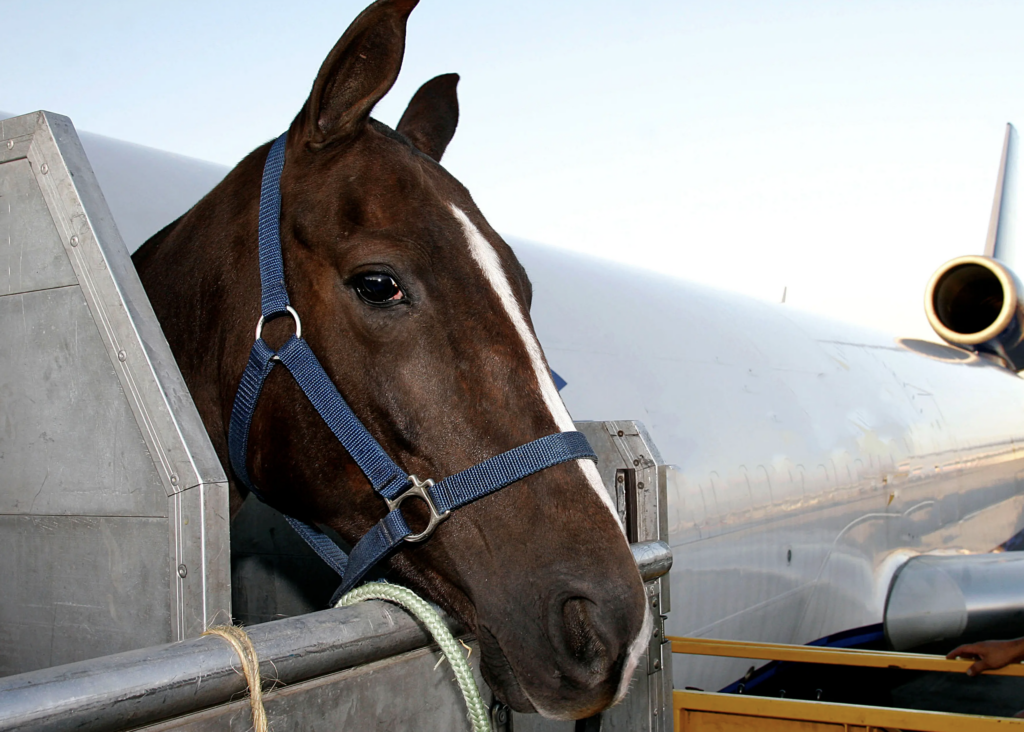
10 Essential Tips for Shipping Your Horse Locally or Long Distance
Michelle DrumTransporting a horse, whether you’re hauling it across town or embarking on a long-distance journey with a commercial shipper, requires careful planning and consideration to ensure your equine companion’s safety, comfort, and well-being. From selecting the right transportation company to preparing your horse for the trip, there are numerous factors to take into account. In this blog post, we’ll explore ten crucial points to keep in mind when shipping your horse, whether it’s a local jaunt or a cross-country adventure.
1. Choose the Right Commercial Shipper
Selecting a reputable and experienced transportation company is paramount when shipping your horse. Look for a company with a proven track record of safety, reliability, and professionalism. Do your research, read reviews, and ask for recommendations from fellow equestrians or your equine veterinarian.

2. Consider Your Horse’s Comfort
Whether you’re shipping your horse yourself or using a commercial shipper, make sure the trailer or transport vehicle prioritizes the comfort and well-being of the horses in their care. The trailer should offer features like proper ventilation, padded partitions, ample space for your horse to move and adjust its posture during the journey, and room for hay and water.
3. Plan Ahead
Plan your transportation needs in advance. Be realistic about your driving abilities if you’re traveling a long distance, and plan for layovers accordingly. This allows you to secure the dates and ensures the transportation company has ample time to prepare for your horse’s journey.
4. Prepare Your Horse
Gradually acclimate your horse to the trailer or transport vehicle before the journey. Practice loading and unloading in the days leading up to the trip, using positive reinforcement techniques to build trust and confidence. Acclimate your horse to wearing wraps or shipping boots before loading up. It’s no fun to trailer or ship a horse that is kicking at the walls because it’s unfamiliar with protective shipping gear. Ensure that your horse is up-to-date on vaccinations, deworming, and any necessary health checks required for travel.

5. Pack Essentials
If you’re transporting your horse yourself, pack an extra halter, spare lead rope, and a filled backup hay net/bag that’s easy to access in your trailer if needed. Additionally, bring essential items for your horse’s journey, including hay, water, and any medications or supplements they may require. Pack enough to last the duration of the trip, plus extra in case of delays or unexpected circumstances. The availability of your horse’s grain and local hay can vary dramatically from one part of the country to another. If your preferred feed isn’t available, plan ahead by either switching your horse to something new before departure or bringing enough with you to make the transition slowly. This will help keep your horse’s stress level low as they adjust to their new environment.
6. Communication is Key
Stay in contact with the commercial shipper during your horse’s travels so someone can be available to assist with loading and unloading if you’re unavailable. If you’re transporting your horse on your own, establish contact with the boarding stable at your final destination and form a relationship with a local veterinarian. Discuss any potential changes to your horse’s diet upon arrival.
7. Monitor Your Horse’s Health
During the journey, unless you’re familiar with how your horse handles shipping, plan to stop every few hours. I like to stop at gas stations or rest areas when I fuel up, taking the opportunity to check on my horse. Look for signs of stress, dehydration, or fatigue, and address any concerns promptly. Ensure your horse has access to fresh water and periodic rest breaks during long trips. If your horse is a picky drinker, consider bringing water from home, as horses accustomed to well water or creek water may refuse treated city water.

8. Check Legal Requirements
Familiarize yourself with any legal requirements or regulations governing the transportation of horses in your area or across state lines. Ensure your horse has all necessary health certificates, permits, and documentation to avoid delays or complications. Most states require the shipper to have a current Negative Coggins (Equine Infectious Anemia) test for the horse within their state of residence. When crossing state lines, you will likely need an additional health certificate from your veterinarian, in addition to the Negative Coggins test. Be sure to check for agricultural checkpoints along your route, as fines for incomplete documentation can be hefty. Know before you go!
9. Be Prepared for Emergencies
Prepare for unforeseen emergencies during transit by having a contingency plan in place. Make sure your truck insurance covers your trailer, and be ready for the unexpected. The U.S. Rider Equestrian Motor Plan is popular among riders who frequently transport horses. Carry a first-aid kit tailored for equine emergencies, and consult your vet for advice on what to include. Banamine and mild sedatives in paste form are often recommended for easy administration if you’re not familiar with giving injections. Let your friends and followers on social media know you’re traveling with your horse. This can help you find reputable layover locations and resources along the way should you need them.
10. Timing and Temperature Are Crucial
Consider your horse’s comfort and the time of year when planning your travels. In hot climates, traveling at night can help keep your horse more comfortable. In colder climates, take care not to over-blanket your horse, as insulating trailers have become popular even in very cold weather. The interior of the trailer can become quite warm once horses are aboard. Horses that sweat or overheat in cold weather can experience a shock when they disembark, potentially leading to health issues. I find it’s best to keep the trailer well-ventilated and let the horse self-regulate its temperature by keeping them unclothed.
Shipping your horse, whether it’s a short local trip or a long-distance haul, requires careful planning, preparation, and attention to detail. By following these ten essential tips, you can ensure a safe, comfortable, and stress-free journey for your equine companion, wherever the road may lead.

You may also like:
